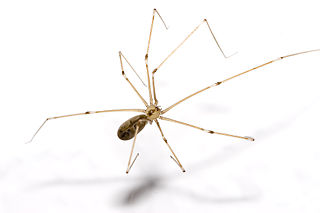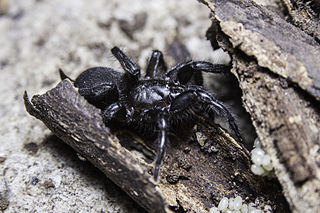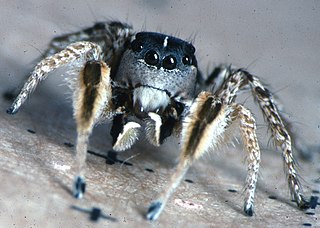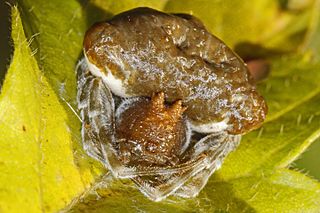
The family Dipluridae, known as curtain-web spiders are a group of spiders in the infraorder Mygalomorphae, that have two pairs of booklungs, and chelicerae (fangs) that move up and down in a stabbing motion. A number of genera, including that of the Sydney funnel-web spider (Atrax), used to be classified in this family but have now been moved to Hexathelidae.

The Araneomorphae are an infraorder of spiders. They are distinguishable by chelicerae (fangs) that point diagonally forward and cross in a pinching action, in contrast to the Mygalomorphae, where they point straight down. Araneomorphs comprise the vast majority of living spiders.

The Pholcidae are a family of araneomorph spiders. The family contains more than 1,800 individual species of pholcids, including those commonly known as cellar spider, daddy long-legs spider, carpenter spider, daddy long-legger, vibrating spider, gyrating spider, long daddy, and skull spider. The family, first described by Carl Ludwig Koch in 1850, is divided into 94 genera.

Crevice weaver spiders (Filistatidae) comprise cribellate spiders with features that have been regarded as "primitive" for araneomorph spiders. They are weavers of funnel or tube webs. The family contains 18 genera and more than 120 described species worldwide.

Velvet spiders are a small group of spiders almost entirely limited to the Old World, with exception of a few species known from Brazil. In Europe some are commonly called the ladybird spiders

Alireza Zamani is an Iranian arachnologist and taxonomist.

Euagrus is a genus of spider in the family Euagridae. It was first described by Anton Ausserer in 1875. It has been referred to as "Evagrus", but this is a transcript error, not an accepted synonym. It is very similar to the genus Allothele, and several species have been transferred there, including Euagrus caffer, Euagrus regnardi, and Euagrus teretis.
Euagrus formosanus is a species of Taiwanese spider in the family Euagridae. It was first described in 1933 from a female specimen found in the Taihoku Prefecture of Taiwan. Its Japanese name is "Taiwan-Jegogume".
Titiotus flavescens is a species of false wolf spiders & wandering spiders in the family Zoropsidae. It is found in the United States.

Habronattus tarsalis is a species of jumping spider in the family Salticidae. It is found in the United States and has been introduced into Hawaii.

Habronattus conjunctus is a species of jumping spider in the family Salticidae. It is found in the United States and Mexico.

Acanthepeira stellata, known generally as the starbellied orbweaver or starbellied spider, is a species of orb weaver in the spider family Araneidae. It is found in a range from Canada to Mexico. It is most commonly found along the Eastern and Western coastline of North America.

Metacyrba punctata is a species of jumping spider. It is found from the southern United States to Ecuador.

Philodromus marxi, the metallic crab spider, is a species of running crab spider in the family Philodromidae. It is found in the United States. They are a sexually dimorphic species. The males are smooth with a metallic sheen and the females present as bristly white and grey.

Mastophora phrynosoma is a species of orb weaver in the spider family Araneidae. It is found in the United States. Like all known species of the genus Mastophora, adult females are bolas spiders, capturing their prey with one or more sticky drops at the end of a single line of silk rather than in a web. Males and juvenile females capture their prey directly with their legs.

Centromerita bicolor is a species of sheetweb spider in the family Linyphiidae. It is found in the United States, Canada, and Europe.

Scytodes fusca, the brown spitting spider, is a species of spitting spider in the family Scytodidae. It is found in Central and Southern America, has been introduced into Europe, tropical Africa, Seychelles, Myanmar, China, Japan, and Hawaii.

Phidippus comatus is a species of jumping spider in the family Salticidae. It is found in North America.
Euagridae is a family of mygalomorph spiders. The group was first described as a tribe in 1979 by Robert Raven, who in 1985 elevated it to a subfamily. In 2020, Optova et al. elevated it further to a family.















